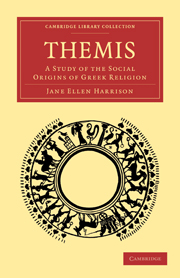Book contents
- Frontmatter
- PREFACE TO THE SECOND EDITION
- INTRODUCTION
- Contents
- ADDENDA ET CORRIGENDA
- CHAPTER I THE HYMN OF THE KOURETES
- CHAPTER II THE DITHYRAMB, THE Δρώμενον AND THE DRAMA
- CHAPTER III THE KOURETES, THE THUNDER-RITES AND MANA
- CHAPTER IV MAGIC
- CHAPTER V TOTEMISM, SACRAMENT AND SACRIFICE
- CHAPTER VI THE DITHYRAMB, THE SPRING FESTIVAL AND THE HAGIA TRIADA SARCOPHAGOS
- CHAPTER VII THE ORIGIN OF THE OLYMPIC GAMES
- CHAPTER VIII DAIMON AND HERO
- CHAPTER IX FROM DAIMON TO OLYMPIAN
- CHAPTER X THE OLYMPIANS
- CHAPTER XI THEMIS
- INDEX
CHAPTER VII - THE ORIGIN OF THE OLYMPIC GAMES
Published online by Cambridge University Press: 07 October 2011
- Frontmatter
- PREFACE TO THE SECOND EDITION
- INTRODUCTION
- Contents
- ADDENDA ET CORRIGENDA
- CHAPTER I THE HYMN OF THE KOURETES
- CHAPTER II THE DITHYRAMB, THE Δρώμενον AND THE DRAMA
- CHAPTER III THE KOURETES, THE THUNDER-RITES AND MANA
- CHAPTER IV MAGIC
- CHAPTER V TOTEMISM, SACRAMENT AND SACRIFICE
- CHAPTER VI THE DITHYRAMB, THE SPRING FESTIVAL AND THE HAGIA TRIADA SARCOPHAGOS
- CHAPTER VII THE ORIGIN OF THE OLYMPIC GAMES
- CHAPTER VIII DAIMON AND HERO
- CHAPTER IX FROM DAIMON TO OLYMPIAN
- CHAPTER X THE OLYMPIANS
- CHAPTER XI THEMIS
- INDEX
Summary
More than one theory has recently been put forward by English scholars, to account for the origin of the Olympic Games. It has been felt that the naive view which sees in these athletic contests no more than the survival of an expedient, comparable to the whisky-drinking at an Irish wake, for cheering up the mourners after the funeral of a chieftain, clearly leaves something to be desired; for it entails the rejection of the whole ancient tradition recorded by Pindar, Pausanias, and others. Some part of this tradition is, indeed, undoubtedly fictitious—the deliberate invention of incoming peoples who wished to derive their claims from a spurious antiquity. Nothing is easier than to detect these genealogical forgeries; but when we have put them aside, there remains much that is of a totally different character—the myths, for instance, used by Pindar in his first Olympian. This residuum calls for some explanation; and no theory which dismisses it bodily as so much motiveless ‘poetic fiction’ can be accepted as satisfactory.
The first hypothesis that claims serious consideration is the current view, lately defended by Professor Ridgeway. Games were held, he says, in honour of heroes, beside the tomb, ‘in order doubtless to please the spirit of the dead man within.’ ‘Athletic feats, contests of horsemanship, and tragic dances are all part of the same principle—the honouring and appeasing of the dead.’
- Type
- Chapter
- Information
- ThemisA Study of the Social Origins of Greek Religion, pp. 212 - 259Publisher: Cambridge University PressPrint publication year: 2010First published in: 1912

